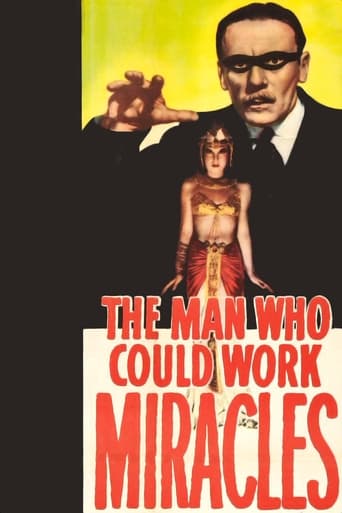Michael Neumann
H.G. Wells' lighthearted fantasy about an unassuming draperies assistant granted the ability to make his every dream come true might be the best film never made by Frank Capra. Normally a very sober thinker, Wells found the perfect balance between philosophy and whimsy for this original screenplay, in which a trio of cosmic gods conduct an experiment to see how the selfish inhabitants of this trifling world might cope with the possibility of total wish fulfillment. Astounded by his unexpected gift (which he believes to be a simple matter of will power), the meek and mild Mr. George McWirter Fotheringay soon finds himself besieged by friends and strangers offering opinions, advice, and partnership offers in lucrative business ventures. Should he use his miracle making for strictly personal gain, or for the benefit of all mankind? There are, of course, unexpected pitfalls to even the best intentions, but the consequences, while hardly optimistic, are never less than entertaining.
bkoganbing
The Man Who Could Work Miracles has its start in the heavens where some Greek God like creatures are roaming among the stars, one of them played by an as yet unknown George Sanders. Apparently H.G. Wells's idea of a Deity was closer to the Greeks and Romans than Christianity. In any event these three creatures discuss the happenings on planet earth where a group of puny creatures dominate, but who might start getting into their realm in the heavens in a few generations.Let's see what they can do if one of them is granted our powers, creation with a mere thought. And with a random selection of a celestial finger it lands on meek little Roland Young as he's entering his local pub.It takes time for Young to grasp the significance of his gift and this is Wells's most telling comment on the film, the sheer pettiness of the average man. From parlor tricks to trying to improve his love life, Young just can't seem to get it into his head what he can do.Of course they're others who do think about these things more deeply than young. But I believe what H.G. Wells was trying to say is that even those who see a bigger picture than Young and attempt to use him only see it from a narrow perspective. The former colonel Ralph Richardson thinks of conquest, Edward Chapman thinks in terms of business and commerce, Ernest Thesiger is a dreamy Utopian with a theological background. Even Young sees the flaws in each of their versions of Utopia.H.G. Wells in his other film that came out around the same time provided the answer by his lights. It was the scientists who should establish the benevolent despotism of the age, they alone have the wisdom to rule all of us. Wells said as much in Things To Come, though I never saw any evidence in the film and in real life that scientists are any better qualified than anyone else. Still that was his view.The subject of humans being given the Godlike power of creation has been done many times. In a more serious version it was the subject of a classic Star Trek episode with Gary Lockwood being given just that power and in a half hour Twilight Zone episode, a hapless Burgess Meredith was a subject of a similar experiment. Meredith made Young's character look hip and appealing.Though some might argue that Cosmo Topper was his career screen role, I would hold out that Everyman George William Fotheringay, selected by the Gods to be The Man Who Could Work Miracles is Roland Young's best part. He's such a hapless slob that each and every one of us can identify with. You might think you would know what to do given his power, but when you examine yourself a bit further......................
ccthemovieman-1
"Disappointing" is the word for this story, based on an H.G. Wells book, which had an interesting premise but the film was way too talky which made it difficult to maintain interest. It also was too secular in nature, but that is not surprising knowing Wells' lack of spirituality.Roland Young is always fun to watch (see "Topper") but there isn't much humor in this....and there should and all of the advice Young received (yak, yak, yak) on how to use his new-found powers was pretty sad. Almost all of it was for monetary gain, which is not surprising. That's the world for you.Only one person seemed to advise him t use his powers for healing. This story has an supernatural/spiritual base to it yet God is never mentioned as someone who has given the man his powers, or given thanks for giving him them, nor consulted on how best to use them. In other words, it's a typical "religious story" written by people who are clueless or have no use for religion.At any rate, there were some special-effects scenes that were fun to watch, such as a clothing store being cleaned up in seconds and a tree suddenly sprouting in the street.This movie COULD have been so good, it's a shame how it wound up.
James Ugrin
I first saw this movie when I was a kid in the fifties. The movie stands out in my mind just as if I saw it yesterday (in fact I am going to see it in the next few days, whenever I can find a place that rents it.) It was interesting and entertaining just as most movies based on H. G. Wells stories are.


